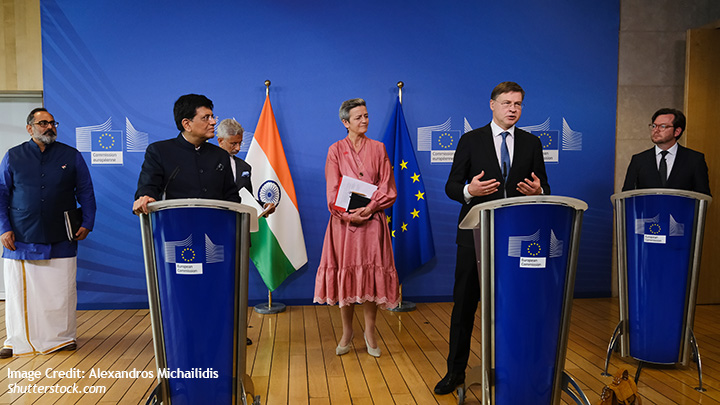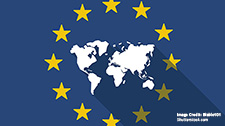Trade, Connectivity and Supply Chains in EU-India Relations

Jagannath Panda
In the decade and a half since 2007 when the EU and India first started their FTA negotiations, the world economic order has undergone a sea change. During that period, Europe has also sought to position itself as a strategic actor seeking to create a secure and rules-based Indo-Pacific through its 2021 Strategy for Cooperation in the Indo-Pacific (SCIP). The release of the Global Gateway strategy in December 2021 holds the potential to leverage China’s increasingly controversial Belt and Road Initiative (BRI) — Italy’s recent withdrawal from the project constitutes another major blow to the venture. Relying on partner states like India to be a ‘gateway’ to Asia’s infrastructure markets is a natural evolution of the EU’s focus on the region. Proof of this is the MoU signed by the EU and India, among others, as a prelude to the launch of IMEC in September 2023. In recent years India has come to recognize that Europe will not just be a ‘likeminded’ natural partner in its multi-aligned foreign policy but can perform a valuable balancing role in the emerging, increasingly multipolar world order.
Whether bipolarity returns with a vengeance, or a truly multipolar order comes into existence, the EU’s importance for India is bound to rise. As the world’s fastest-growing economy in 2023, India presents immense potential, making it a compelling partner vis-à-vis a sustainable and technologically advanced Europe. This is therefore a good opportunity to take a fresh look at the EU-India relationship, which has long focused solely on trade and economic issues. EU-India cooperation in this domain –which should be further stepped up – but also in the areas of technology, connectivity, and critical raw materials can revitalize the new economic order and foster inter-regional linkages.
This chapter highlights how deeply intertwined economic and security interests in a context of changing dynamics in the Indo-Pacific can result in new opportunities for more solid EU-India cooperation. It will also cover how connectivity projects and ventures into supply chain resilience and critical raw materials contribute to their economic and green ambitions. India recognizes that the EU plays a valuable balancing role in the evolving world order, and the EU sees India as a strategic partner with vast economic potential.
This chapter by Jagannath Panda is published in the EUISS’s Chaillot Paper titled EU-India Relations: Gaining Strategic Traction? (February 2024) edited by Amaia Sánchez-Cacicedo.
Related Publications
-
ISDP Annual Report 2023
ISDP’s Annual Report for the year 2023. We look back on 2023, a year in which tensions and conflicts captured the strategic space in ISDP’s focus areas, making headlines around […]
-
India-Middle East-Europe Economic Corridor: Will It Get Subsumed by Its Grand Vision?
The recently concluded Group of Twenty (G20) Summit in New Delhi under India’s presidency was, undoubtedly, a crowning moment for India. From providing the G20 with new relevance among the […]
-
EU-Thailand FTA Negotiations: IUU Fishing and Human Rights Remain Obstacles
Thailand’s fishing industry, which at its height saw as many as 200,000 migrant workers from neighboring Laos, Myanmar, and Cambodia caught in a brutal system of abuse, withered global criticism […]
-
Indo-Pacific Security in 2030-35: Links in the Chain
In recent years, events like the COVID-19 pandemic and the Russia-Ukraine war have brought global supply chains squarely under the spotlight. The economic impact of these disruptive events exposed the […]
-
Quad Plus EU: A Viable Option for the Times?
Today, the primary Indo-Pacific contest is not just about the China-US hegemony. It also involves a range of so-called “middle powers” – including Australia, France, Germany, India, Indonesia, Italy, Japan, […]




